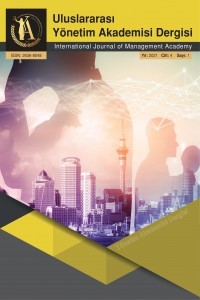Rusya’nın 2022 Yılındaki Ukrayna İşgaline Karşı Büyük Güçlerin Tepkileri
: Rusya Ukrayna Savaşı, Yayılmacılık, Büyük Güçler, Dünya Düzeni, Güvenlik Anlayışının Değişimi, Russia Ukraine War, Expansionism, Great Powers, World Order, Change of Security Perception
The Attitudes of the Great Powers against Russia's Invasion of Ukraine in 2022
Russia Ukraine War, Expansionism, Great Powers, World Order, Change of Security Perception,
___
- AUSTRALIAN DEPARTMENT OF FOREIGN AFFAIRS AND TRADE (2018), “Australia and Ukraine”, DFAT Corporate Web Page, https://www.dfat.gov.au/sites/default/files/ukraine-country-brief.pdf (Erişim Tarihi: 20.05.2022).
- AUSTRALİAN GOVERNMENT DEFENSE (2022), “Australia Increases Support to Ukraine”, Defence Corporate Web Page, https://www.minister.defence.gov.au/media-releases/2022-07-04/australia-increases-support-ukraine (Erişim Tarihi: 08.07.2022).
- BUREAU OF POLITICAL-MILITARY AFFAIRS (2022), “U.S. Security Cooperation with Ukraine”, US Department of State, 4 October 2022.
- CONGRESSIONAL RESEARCH SERVICE (2022), “U.S. Security Assistance to Ukraine”, Congressional Research Service, 29 August 2022, S.1-3.
- DOU, Eva ve WU, Pei Lin (2022), “Ukraine Helped Build China’s Modern Military, But When War Came, Beijing Chose Russia”, Washington Post Corporate Web Page (E-Article), https://www.washingtonpost.com/world/2022/03/09/china-ukraine-arms-history/ (Erişim Tarihi: 08.10.2022).
- EUROPEAN COMMISSION (2022), “EU Solidarity with Ukraine: The EU Stands United with Ukraine”, European Commission Corporate Web Page, 6 October 2022.
- EUROPEAN COUNCIL (2022), “EU Response to Russia's Invasion of Ukraine”, Consilium Corporate Web Page, https://www.consilium.europa.eu/en/policies/eu-response-ukraine-invasion/ (Erişim Tarihi: 08.10.2022).
- HOOK, Kristina (2022), “Why Russia’s War in Ukraine is a Genocide: Not Just a Land Grab, but a Bid to Expunge a Nation”, Foreignaffairs Corporate Web Page (E-Haber), https://www.foreignaffairs.com/ukraine/why-russias-war-ukraine-genocide (Erişim Tarihi: 01.10.2022).
- LIN, Andy, REED, John ve SEDDON, Max (2022), “India and China Undercut Russia’s Oil Sanctions Pain”, Financial Times Corporate Web Page (E-Haber), 7 September 2022, https://www.ft.com/content/b38d3ab5-ea57-400e-87e9-f48eaf3e0510 (Erişim Tarihi: 12.09.2022).
- RADIO FREE EUROPE (2022), “UN General Assembly Overwhelmingly Approves Resolution Demanding Protection of Civilians in Ukraine”, Rferl Corporate Web Page (E-Haber), https://www.rferl.org/a/united-nations-civilians-protection/31769041.html (Erişim Tarihi: 09.10.2022).
- RAHMAN, Mujtaba (2022), “EU Support for Ukraine, the Next Six Months”, Politico (E-Article), 22 August 2022.
- SBS NEWS (2022), “Australians Should Prepare for Russia-Ukraine War to go on for Longer, Richard Marles Says”, SBS News Corporate Web Page (E-Haber), https://www.sbs.com.au/news/article/australians-should-prepare-for-russia-ukraine-war-to-go-on-for-longer-richard-marles-says/ltgg8dwgo (Erişim Tarihi: 25.09.2022).
- STRAITTIMES (2022), “Ukraine War Spurs Pacifist Japan to Consider Stronger Military”, The Straitstimes, 6 April 2022, https://www.straitstimes.com/asia/east-asia/ukraine-war-spurs-pacifist-japan-to-consider-stronger-military (Erişim Tarihi: 25.09.2022).
- THE GOVERNMENT OF JAPAN (2022), “Japan Stands with Ukraine”, The Government of Japan, 26 September 2022, S.1-4, https://japan.kantei.go.jp/ongoingtopics/pdf/jp_stands_with_ukraine_eng.pdf (Erişim Tarihi: 25.09.2022).
- THE HINDU (2022). “Neutrality and Abstention: On India’s Stand in the Russia-Ukraine Conflict”, The Hindu Corporate Web Page (E-Article), https://www.thehindu.com/opinion/editorial/neutrality-and-abstention-the-hindu-editorial-on-indias-stand-in-the-russia-ukraine-conflict/article65972267.ece (Erişim Tarihi: 03.10.2022).
- THE WHITE HOUSE (2021), Renewing America’s Advantages: Interim National Security Strategic Guidance, The White House Publisher, Washington.
- TORODE, Greg (2022), “Analysis: Ukraine Crisis Threatens China's Discreet Pipeline in Military Technology”, Reuters (E-Article), https://www.reuters.com/world/china/ukraine-crisis-threatens-chinas-discreet-pipeline-military-technology (Erişim Tarihi: 01.09.2022).
- U.S DEPARTMENT OF DEFENSE (2022), “Fact Sheet: 2022 National Defense Strategy”, U.S Department of Defense, 28 March 2022, S.1-2, https://media.defense.gov/2022/Mar/28/2002964702/-1/-1/1/NDS-FACT-SHEET.PDF (Erişim Tarihi: 01.09.2022).
- UKRAINE CRISIS MEDIA CENTER (2022), “Japan’s Unprecedented Support for Ukraine”, Ukraine Crisis Media Center Corporate Web Page (E-Article), https://uacrisis.org/en/ukraine-in-flames-209 (Erişim Tarihi: 05.10.2022).
- UNITED NATIONS (2022), “So-Called Referenda in Russian-Controlled Ukraine ‘Cannot Be Regarded as Legal’: UN Political Affairs Chief”, United Nations, 11 September 2022,
- VERSTAPPEN, Stefan H. (2017), The Thirty-Six Strategies, Woodbridge Press, Toronto.
- WISHNICK, Elizabeth (2022), “Still ‘No Limits’? The China-Russia Partnership After Samarkand”, Russianmatters, 22 September 2022, https://www.russiamatters.org/analysis/still-no-limits-china-russia-partnership-after-samarkand (Erişim Tarihi: 05.10.2022).
- ISSN: 2636-8048
- Başlangıç: 2018
- Yayıncı: Mehmet MECEK
Rusya’nın 2022 Yılındaki Ukrayna İşgaline Karşı Büyük Güçlerin Tepkileri
İşin Anlamı, Mutluluk ve İş Tatmini Arasındaki İlişkinin İncelenmesine Yönelik Bir Araştırma
Askeri Depo Yer Seçiminde AHP Tekniğinin Uygulanması: Türkiye İçin Ampirik Bir Analiz
Galip Cihan YALÇIN, Karahan KARA
Türk Devletleri Teşkilatının Siyasi ve Ekonomik Potansiyeli
Şikâyet Yönetiminin Marka Değerine Etkisi: TRC3 Bölgesi Üzerine Bir Uygulama
